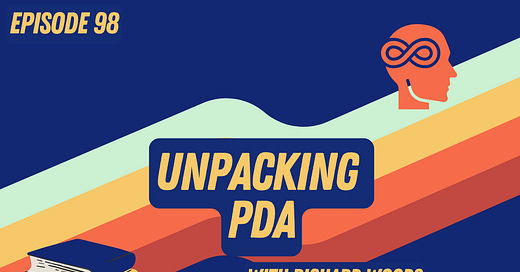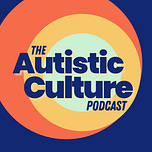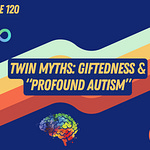An episode that defies the norms.
Here’s what’s in store for today’s episode:
Today, hosts Matt and Angela explore the intriguing and often debated world of Pathological Demand Avoidance with special guest Richard Woods.
Pathological Demand Avoidance, also known in more affirming circles as Persistent Drive for Autonomy, describes a strong need to question and resist demands, often co-occurring with autism. This trait can manifest as an intense drive for control, leading individuals to navigate the world in ways that prioritize autonomy and flexibility over compliance.
Most of what we know about PDA autism—and the stereotypes surrounding it—are heavily focused on children. In reality, PDA exists on a spectrum, and many adults also experience its traits, often in ways that go unrecognized or misunderstood.
Many neurotypicals see PDA as indistinguishable from Oppositional Defiant Disorder (ODD), when in reality, PDA is often the underlying factor in these cases, driven by a need for autonomy rather than intentional defiance.
We explore the validity of Theory of Mind in relation to PDA and the problems with pathologizing demand avoidance.
Our hosts and special guest discuss the misconception that PDA traits fade with age—when in reality, PDA individuals learn to accommodate themselves and establish clear boundaries as they grow into adulthood.
We explore the overlap between PDA and ODD, and why Richard believes that PDA isn’t a form of autism, but rather a distinct profile of neurodivergence.
Additionally, we discuss how neurotypicals often struggle to differentiate CPTSD symptoms from autism, as many have never encountered a healthy, healed autistic person.
The discussion then shifts to how the world is not designed for autistic or disabled people in general, and how this lack of accessibility and understanding can exacerbate PDA traits, making self-advocacy and autonomy even more crucial.
We talk about labels, how they affect our ability to get our needs met, and what Richard's "post-autistic identity" entails in the broader conversation around neurodivergence and self-definition.
Finally, we reflect on the importance of self-advocacy, community, and embracing neurodivergence beyond medical labels, as well as the role of monotropic focus in the autistic experience.
“May your stimming activities be many, and your flow states long.”
About Richard Woods:
Richard Woods is the leading Demand Avoidance Phenomena (Pathological Demand Avoidance) authority (by academic work and experience) and Author.
He is attributed as autistic, but has a "post-autistic identity" as he is no longer basing his identity on psychiatric categories.
“I tend to view PDA as literally about the management of stress. A lot of people express these features because they are distressed and or stressed by the demands being placed upon them. And often with autistic people, it seems to be more of a cognitive style. We’re to be stressed when you put us in a very chaotic, very high-demanding world.” - Richard Woods
“The modern life isn’t built for autistics. It’s so much noise, so much sound, so much that is visual and tactile. It’s not built for disabled people in general.” - Richard Woods
“That’s the thing [about autistic kids] - when we have a safe person, when we have that anchor person, it frees us to be more objective, or to object rather, because it’s safer to object. As opposed to a total stranger, you may not feel safe saying, ‘no, I don’t want to do that. But with someone you trust, you say, ‘no, there’s no way I’m going in there. You can’t make me do that.’ That’s not going to happen, because you know you’re not going to be met with that judgment and the criticism that comes along with that of a stranger.” - Matt
In this episode, we take a deep dive into the world of Pathological Demand Avoidance (PDA) autism, a lesser-known but important part of the spectrum. From the intense need for autonomy to the challenges of navigating a demand-heavy world, we explore what PDA really is—and what it isn’t. Join Matt and Angela as they break down common misconceptions, discuss how PDA presents in adults, and chat with expert Richard Woods about the affirming perspective of Persistent Drive for Autonomy. Have you experienced PDA traits in yourself or others? Share your thoughts with us using #AutisticCultureCatch on social media!
Show Notes:
There is substantial debate over what PDA is. Presently my view PDA is not an "autism profile"/ autism subgroup/ autism subtype, or anything of the kind. For a short 800 word overview of current debates on PDAby Richard Woods, please see below:
Richard Woods ORCiD: https://orcid.org/0000-0002-8292-632X
https://monotropism.org/dinah/
https://dlcincluded.github.io/MQ/
Pathological Demand-Avoidance" (PDA) in Frontiers in Education, please see the call for papers below for more information:
Related Shows:
Follow us on Instagram
Find us on Apple Podcasts and Spotify
Learn more about Matt at Matt Lowry, LPP
Join Matt’s Autistic Connections Facebook Group
Learn more about Angela at AngelaKingdon.com
Angela’s social media: Twitter and TikTok
Our Autism-affirming merch shop















Share this post